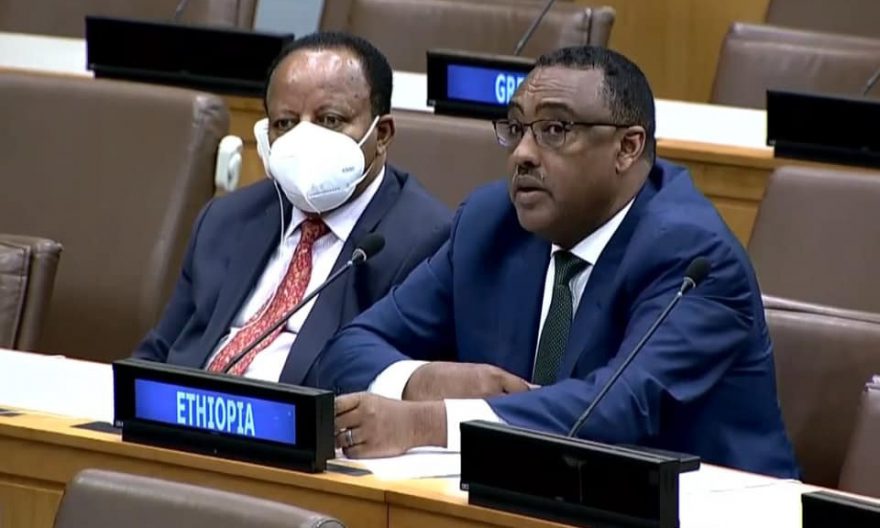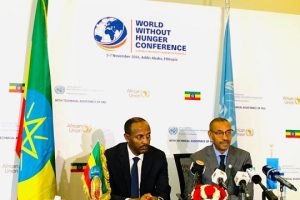
The 76th United Nations General Assembly ( UNGA) that took place in New York City concluded on Monday by giving due emphasis to issue of multilateralism. In the high level meetings, quite a lot of world leaders tossed a considerable amount of ideas around.
Pledging on
strengthening international cooperation based on mutual trust and cooperation,
various countries openly opposed unilateralism and external interferences on
the sovereign matters of other countries. From Ethiopia to China, a number of
countries put forward strong argument on the need for international order
guided by respect and consensus.
Speaking at the General Debate of the 76th Session of the United Nations General Assembly Demeke Mekonnen deputy Prime Minister and Foreign Minister of Ethiopia said, “In the past few years, we heard from these podium voices of justified concern and call for rule-based world order and viable multilateralism. Ethiopia, has always been steadfast in its support for multilateral institutions. Our position emanates not from rhetoric but from our tragic ordeal during the days rule-based order was left in the shambles.”
“We commend the declaration of return and renewal of commitment to multilateralism. At the same time, we see a glaring need to reiterate the fundamental values of sovereign-equality, non-interference, and cooperation based on mutual benefit and respect. Multilateralism stands on the shoulders of states that ably-guard their sovereignty, territorial integrity and political independence.”
Multilateralism will meet its objective only if states are able and free to manage their domestic and external affairs. Indeed, our human aspirations are inherently similar. However, our viewpoints that are underpinned by our diversity in cultures, history, and socio-economic reality will not always be fully-aligned.” he added.
“This diversity shall be viewed as an asset and no one amongst us should wish to prevail over the other, especially when it comes to values and policies dealing with our internal and external affairs,” he continued.
He elucidated that three years ago, my country, Ethiopia embarked on a promising journey of reform. The changes we introduced ushered-in democracy, human rights, human development, and regional stability. It also opened avenues for dialogue and unity among divergent political and interest groups.
He stressed that tapping into Ethiopia’s rich history and enormous potential, the reform charted our inevitable and bright future – placing Ethiopia as a new horizon of hope. It overturned a complex network of corruption, illegitimate political power, and illicit financial flows — installed at the cost of national interest and the detriment of regional peace.
He kept on saying, “The reform, however, was not without challenges. As any other democracy, our democratic process is an attempt to find a balance between stability and disruption. In Ethiopia, groups that consider equality as subjugation are making their best effort to create and prolong anarchy.”
He further stressed that the Grand Ethiopian Renaissance Dam – a hydroelectric dam project we fully financed underwent a second-year filling. Hopefully, we inspired others to develop local capability to plan, finance, and complete renewable energy projects. However, our humble attempt to light the houses of millions of Ethiopians and create hope for our youth is politicized before global bodies. This peoples’ project also received unending threats.
“Ironically, we are accused and threatened for drinking from our water. On the matter of the Nile and the GERD, our confidence is in the might of the truth, wisdom and justice that has always defined our path for cooperation. The generational desire to use our natural resources will not be stopped by a colonial legacy and monopolistic cause. We hope our negotiating partners are prepared for a win-win outcome under the African Union led process.”
It is to be recalled that submitting a letter under the aegis of Chinese archetypal, a category of three nations by way of illustration China, Cuba, DPRK, Indonesia, Iran, Nicaragua, Russian Federation, Sri Lanka, Syria, Tajikistan, Thailand, Venezuela and Zimbabwe came up with a latest proposal in putting up with human rights all over the world.
Of late, the joint statement delivered by Ambassador Chen Xu at the ID with Independent Expert on International Order at the HRC48 on 20 September 2021 reads that a democratic and equitable international order is essential to the promotion and protection of human rights.
All parties should practice true multilateralism and make the international order more just and equitable so as to effectively guarantee the full enjoyment of human rights. To this end, we should: First, uphold fairness and justice firmly uphold the UN-centered international system and the international order underpinned by international law, and oppose bullying, unilateralism and double standards, the statement added.
Second, pursue win-win cooperation, conduct dialogue and cooperation on the basis of equality and mutual respect, bridge differences through consultations and dialogue, achieve universal security through cooperation and promote common development and prosperity. Third, remain open and inclusive, respect the diversity of civilizations and the development paths independently chosen by countries, and refrain from imposing one’s own social system and model on others or creating division and confrontation.
According to the statement in the field of human rights, all parties should uphold the principles of universality, impartiality, objectivity and non-selectivity, strengthen solidarity, cooperation and dialogue on an equal footing, and refrain from politicizing human rights issues or interfering in other countries’ internal affairs. We call on all States to join hands in defending the common values of humanity, namely peace, development, equity, justice, democracy and freedom, promoting and protecting human rights and building a community with a shared future for human beings.
Facing growing tensions with the United States, Chinese leader Xi Jinping reiterated his nation’s longtime policy of multilateralism telling world leaders at the United Nations that disputes among countries “need to be handled through dialogue and cooperation.”
Zhao Lijian, Spokesperson for the Ministry of Foreign Affairs of People’s Republic of China said, “China opposes new US sanctions regime on Ethiopia. We hope the US will be prudent and play a constructive role. We believe the parties concerned in Ethiopia have the wisdom and capability to properly resolve differences, realize national reconciliation and restore peace and stability,”
It should be remembered that the Secretary-General met with Demeke Mekonnen Hassen, according to information obtained from the Ministry of Foreign Affairs of Ethiopia.
The Secretary-General and the Deputy Prime Minister discussed the internal situation in Ethiopia, particularly in Tigray. The Secretary-General reiterated his call for steps towards peace and noted the need for the further facilitation of humanitarian access.
Regarding the Grand Ethiopian Renaissance Dam, the Secretary-General underlined the importance of resuming dialogue in a spirit of compromise and reaffirmed the United Nations’ support for the African Union’s mediation efforts.
BY ADDISALEM MULAT
ETHIOPIAN HERALD 29 SEPTEMBER 2021




